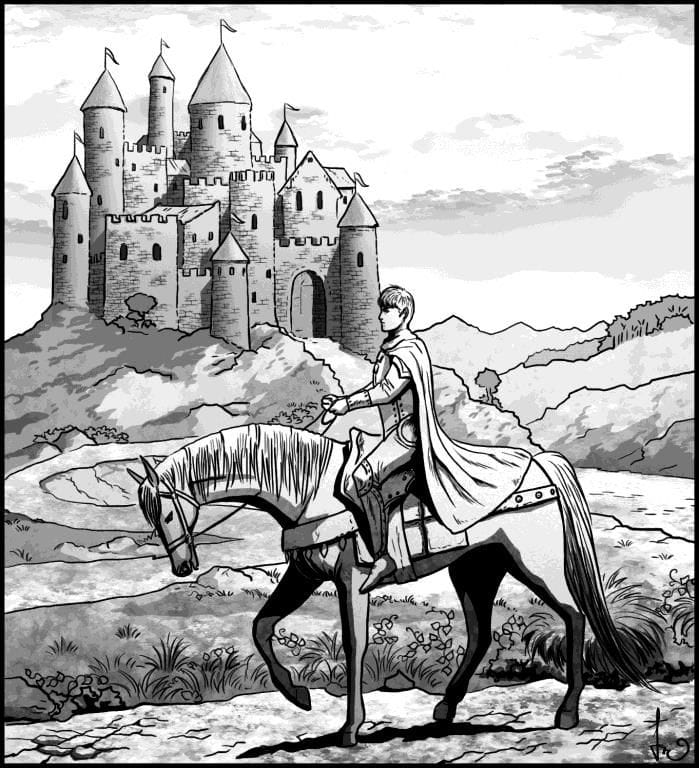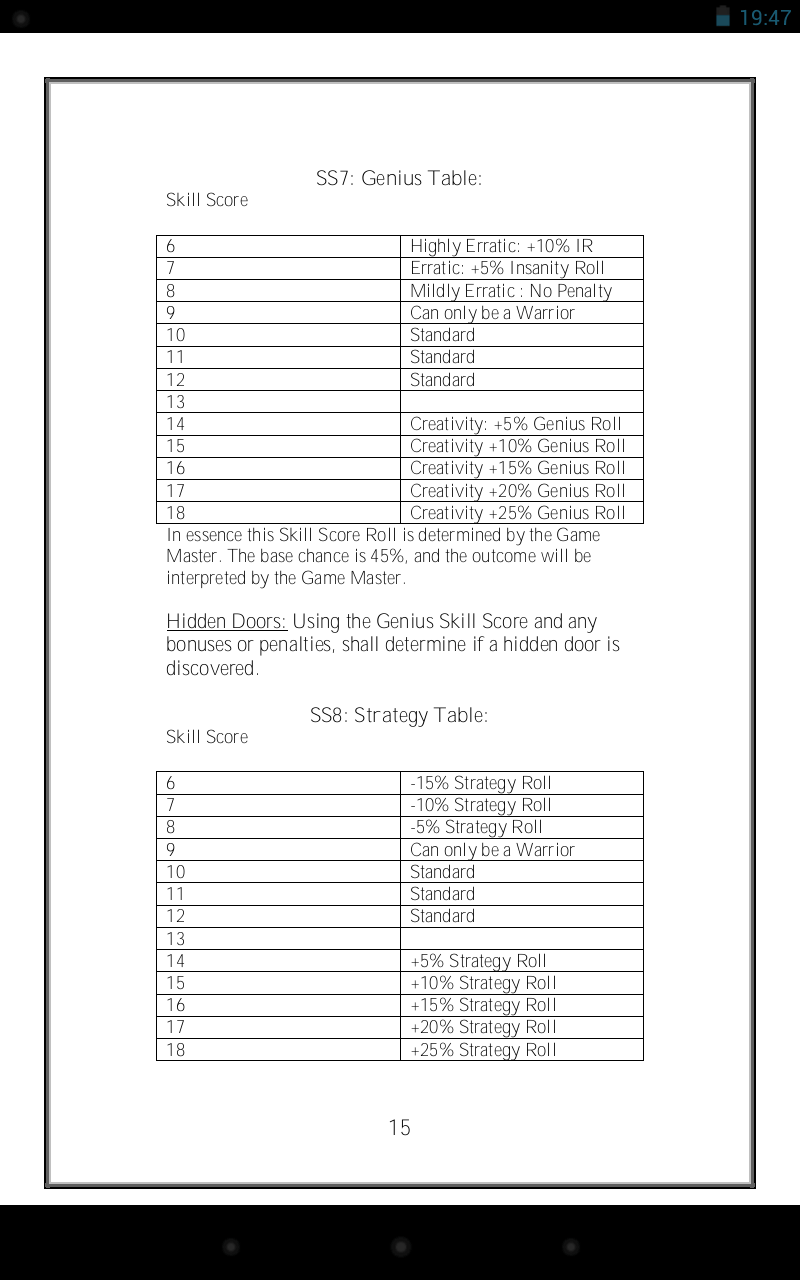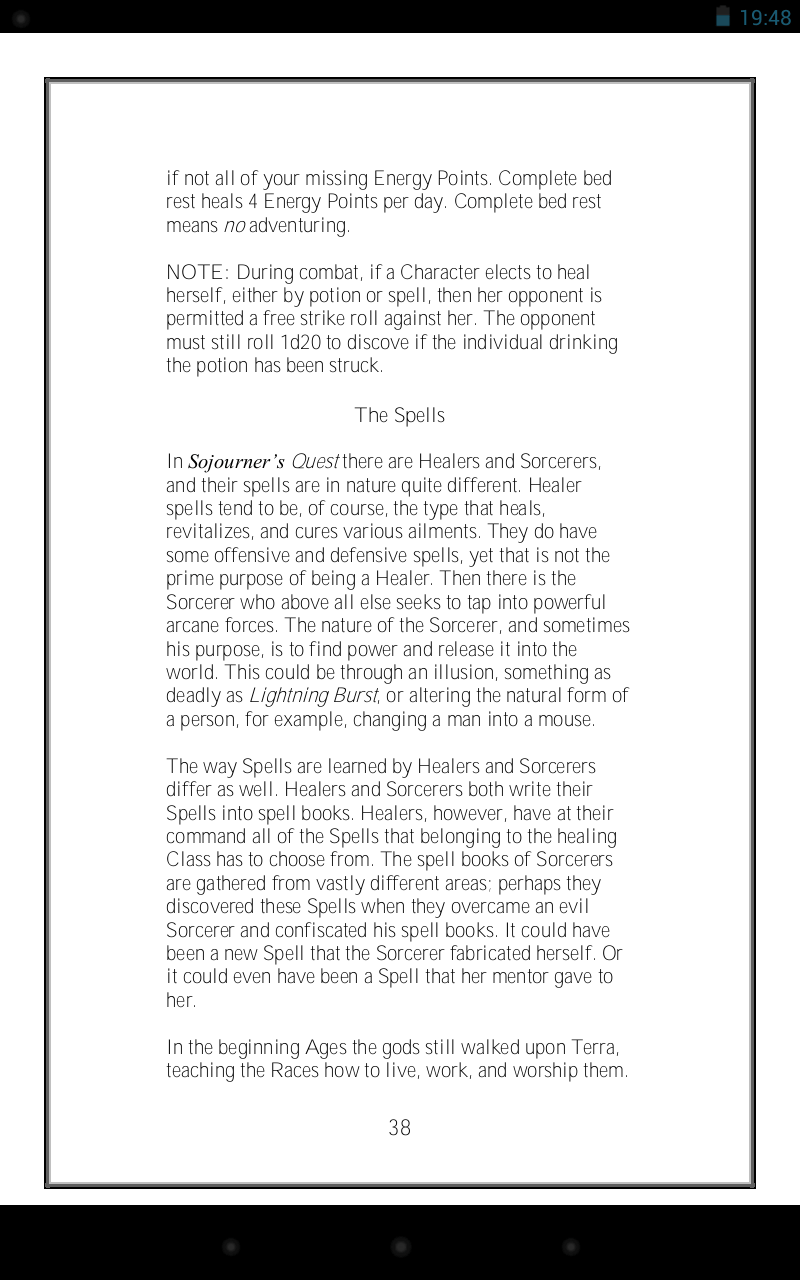Sojourner’s Quest is an RPG by Randall C Ellis. The 168-paged PDF, illustrated by Agnieszka Miroslaw-Kalinowska, is on sale at DriveThru RPG for $4.95.
The game, along with the free to download character sheets, was the first upload to Sojourner Games’ home in the electronic retailer and has been followed by Module SQ1: Wynold Forest, In the Hall of the Goblin King and Advanced Sojourner’s Quest, The Races of Sultharia, Optional Knowledge for Gaming. That’s four uploads in just a month.
Geek Native reached out to Ellis and pestered for some comments, insight and observation. Kindly, he agreed to some questions and gave permission for the blog to share a few pages from inside Sojourner’s Quest.
Can you tell readers a little bit about yourself and Sojourner Games? Is this your first project?
Where to begin? I once was a Cultural Anthropologist, worked in museums, yet now I have turned to writing instead. It made more creative sense, not financial, to write. Yes, this is most definitely my first attempt at game design. I believed there was a lack of a playable Old School games. AD&D is wonderful, and I still develop many parts of my campaigns, yet I realized I could make something different. Something more streamlined and with a fresh perspective.
You’ve described Sojourner’s Quest as a retro-clone of old school Advanced Dungeons & Dragons. For readers not familiar with the term – what does that mean?
Initially I did describe it as such in Sojourner’s Quest; now I see it as a having a good foundation for a new idea. Since ideas are not copyrighted, why not develop something new? I cannot claim to be gifted in game design, but maybe I had a few interesting ideas. Old School retro-clone is a simulacrum, a practically verbatim copying idea of a previous game system. Perhaps that is what it is, however, I would like to free the game from that perspective, and in general state that Sojourner’s Quest tends to bring back a sense of simple wonder. Or it could.
In the post The Debate: What is OSR the interactive poll reveals that there is little agreement to what exactly OSR means. The standout clause is that OSR is about roleplaying games that do not require high levels of commitment. Does that describe Sojourner’s Quest and what does OSR mean to you?
OSR means Old School Renaissance; A return to wonder and marvels. On a deeper level, OSR is an awareness, like a concept idea, where improvisation and imagination and creativity join together to fashion a re-vitalization of the genre. The only commitment an OSR game needs is an investment of time and the practice of wild imagination. That is where I want to be. Sojourner’s Quest can be played simply. I like that, and it is also adaptable enough for experienced campaigners.
I’ve an electronic copy of Sojourner’s Quest and was able to easily read it on my Nexus 7. That’s a small tablet but the design and layout of the game was well suited to the device. The two screen grabs below are captures from the Nexus 7. There’s no pinch, zoom and hunting for your paragraph at all.
Does the idea of gamers using Android tablets to read your retro-clone sit well with you? Or is it horrible?
If it is readable then that is great. As long as people are enjoying themselves. The game is about creative fun, the vehicle of transmission, as long as it is dependable, matters little.
Is the layout choice for the game a nod towards electronic reading or just a practical and straight forward way to present the game?
The layout was chosen for clarity, and accessibility. It was practical. I thought that to present the game in transparent terms would be best; and in that respect, a good story needs to be clear.
Sojourner’s Quest is an easy game to read though. This is in part thanks to Ellis’ writing style but also because it is a straight forward game to master. The RPG feels as if it could be a young gaming group’s first tabletop experience or an old favourite for a team of veteran players.
What were the biggest game mechanics challenges you faced in putting the game together?
Simplifying the Combat Tables, and the Experience credit Tables were the most difficult for me. They were the absolute primary concerns I worked with first. Tables like those are the backbone of the game. So they need to be fair, and easy to read. After that, it was the order in which the Character should be put together. It was there that some originality came into being. There is a flow to creating a Character, a sense of what works. Once I determined that, the rest of the book fell into place.
How important are game mechanics when it comes to creating fun games? Are they split 50/50 with the GM? Or do you think the GM is responsible for a greater share of the success?
Game mechanics need to be understandable, and make a kind of sense. If not, everything seems arbitrary. And while inconsistent might make for crazy fun, I prefer to have a more orderly approach. There are undercurrents and unseen connections in game mechanics I was unaware of. I learned. The GM and Players are co-participants in making a working campaign. Yes, the GM invests much time and devotion to making a sound game. Yes the Players make it worthwhile by respecting the rules and engaging themselves in the game.
Sojourner Games are pricing downloads generously. Character sheets are free, the main game is less than $5 and the first two supplements barely more than $1. This isn’t uncommon among the OSR community but I wanted to discuss this with the author.
What’s the business plan for Sojourner’s Quest? Will you keep on publishing supplements?
A great financial success would be excellent! I will settle for a solid acceptance and intrigue with Sojourner’s Quest. The business plan? Highly secret, however I shall mention that Sojourner Games plans to continue with modules, and by the end of the year, or early next year, have a version out called Sojourner’s Quest Unlimited.
Do you think OSR will have any effect on the prices of RPGs as a whole?
I am a newcomer. I am seeking and hoping people will notice the work I have available. The prices I have established are an effort to bring people’s interest to bear on what is going on. One of the matters with OSR, is functionality and affordability. Right now WotC is beginning to flood the market with Old School material. Obviously, they seek to establish a following once again with Old School gamers. Their prices, will affect the market. Yet, I think people will look beyond pricing this time. OSR is about quality, not “bling”, originality of thought, not re-hashing the old standards and doing minimal tweaking to get by. I am hardly a market expert. It is just a guess.
Scroll down to find the Geek Native community comment section.





$4.95 only for this game? This is rather cheaper than other games. math solving games
Yes. As a pdf, $4.95.